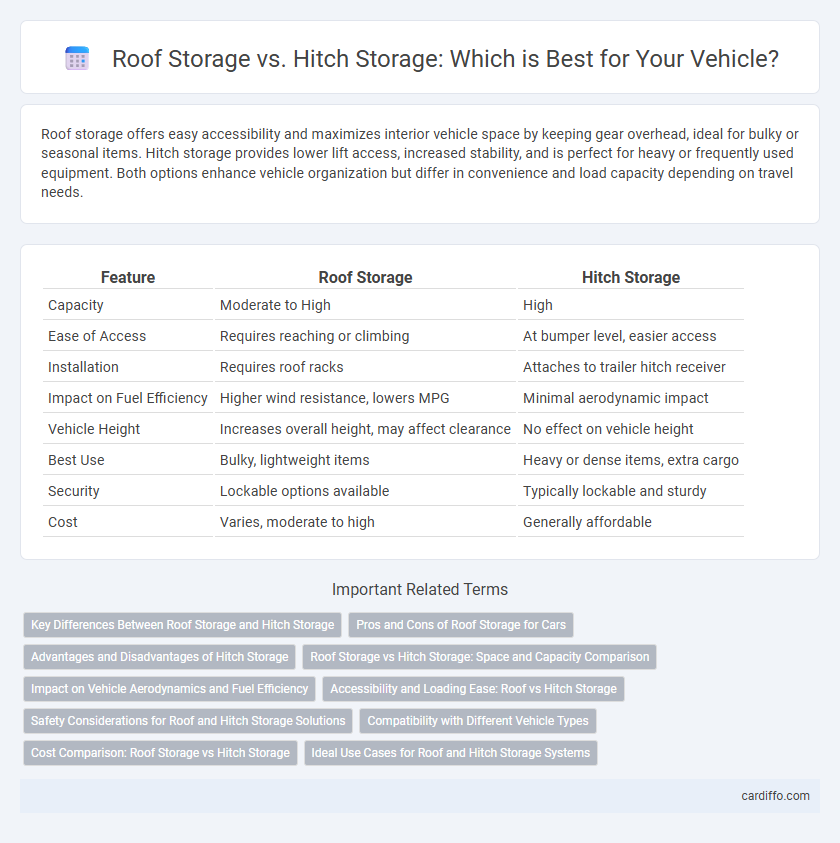Roof storage offers easy accessibility and maximizes interior vehicle space by keeping gear overhead, ideal for bulky or seasonal items. Hitch storage provides lower lift access, increased stability, and is perfect for heavy or frequently used equipment. Both options enhance vehicle organization but differ in convenience and load capacity depending on travel needs.
Table of Comparison
| Feature | Roof Storage | Hitch Storage |
|---|---|---|
| Capacity | Moderate to High | High |
| Ease of Access | Requires reaching or climbing | At bumper level, easier access |
| Installation | Requires roof racks | Attaches to trailer hitch receiver |
| Impact on Fuel Efficiency | Higher wind resistance, lowers MPG | Minimal aerodynamic impact |
| Vehicle Height | Increases overall height, may affect clearance | No effect on vehicle height |
| Best Use | Bulky, lightweight items | Heavy or dense items, extra cargo |
| Security | Lockable options available | Typically lockable and sturdy |
| Cost | Varies, moderate to high | Generally affordable |
Key Differences Between Roof Storage and Hitch Storage
Roof storage offers elevated cargo capacity that maximizes vehicle floor space, ideal for bulky items like kayaks or skis, while hitch storage provides ground-level access, making it easier to load heavy or awkward items such as coolers or camping equipment. Roof racks typically increase wind resistance, potentially affecting fuel efficiency, whereas hitch carriers maintain aerodynamics but require a compatible hitch receiver and may reduce rear visibility. Vehicle weight limits and ease of installation are critical factors; roof storage demands a strong roof rack system and can impose weight restrictions, whereas hitch storage systems vary in weight capacity but often allow quick attachment and removal.
Pros and Cons of Roof Storage for Cars
Roof storage for cars offers increased cargo capacity without occupying interior space, making it ideal for bulky items like skis or camping gear. However, it can negatively impact fuel efficiency due to added aerodynamic drag and may increase vehicle height, limiting garage access. Installation and removal can be time-consuming, and items stored on the roof are more exposed to weather and theft risks compared to hitch storage.
Advantages and Disadvantages of Hitch Storage
Hitch storage offers easy access and convenient loading due to its low mounting position, making it ideal for heavy or bulky items. However, it can reduce rear visibility and ground clearance, and may interfere with towing capabilities or rear vehicle sensors. Compared to roof storage, hitch storage generally provides better fuel efficiency since it does not significantly increase aerodynamic drag.
Roof Storage vs Hitch Storage: Space and Capacity Comparison
Roof storage offers significant space advantages by utilizing the vehicle's aerodynamically-designed roof rack systems, enabling the transport of bulky items like skis, kayaks, and rooftop cargo boxes without compromising interior passenger comfort. Hitch storage typically provides lower capacity but excels in ease of access and versatility, accommodating cargo carriers, bike racks, and cargo trays that are directly mounted at the vehicle's rear, freeing up roof space for other uses. When comparing space and capacity, roof storage generally maximizes volume while hitch storage optimizes convenience and payload flexibility for heavy or awkward items.
Impact on Vehicle Aerodynamics and Fuel Efficiency
Roof storage significantly increases aerodynamic drag by disrupting airflow over the vehicle, leading to reduced fuel efficiency. Hitch storage maintains a lower profile behind the vehicle, minimizing drag and thus preserving better fuel economy. Studies show hitch-mounted carriers can improve fuel savings by up to 20% compared to roof-mounted options.
Accessibility and Loading Ease: Roof vs Hitch Storage
Hitch storage offers superior accessibility by positioning cargo at a convenient height near the rear of the vehicle, simplifying loading and unloading compared to roof storage. Roof storage requires lifting heavy items overhead, which can be challenging and time-consuming, especially for larger or heavier cargo. Leveraging hitch storage reduces physical strain and enhances safety, making it an optimal choice for frequent or bulky loads.
Safety Considerations for Roof and Hitch Storage Solutions
Roof storage solutions require careful weight distribution to prevent vehicle instability and increased rollover risk, emphasizing the importance of adhering to manufacturer load limits. Hitch storage minimizes impact on vehicle center of gravity, but must be securely attached to avoid sway and potential detachment during transit. Both options demand regular inspection of mounting hardware and loads to ensure safe transportation and prevent accidents.
Compatibility with Different Vehicle Types
Roof storage systems offer broad compatibility across various vehicle types, including SUVs, sedans, and hatchbacks, by securely attaching to factory-installed or aftermarket roof racks. Hitch storage solutions are primarily compatible with vehicles equipped with Class I, II, or III hitches, typically found on trucks, SUVs, and some crossovers, allowing for easy access and greater payload capacity. Considering vehicle type and towing hitch class is essential for selecting the most efficient storage option that maximizes space without compromising safety.
Cost Comparison: Roof Storage vs Hitch Storage
Roof storage typically involves higher initial costs due to installation and equipment such as roof racks or boxes, ranging from $200 to $1,200 depending on size and material. Hitch storage options generally have lower entry prices, averaging between $100 and $500, with the added convenience of easy installation and removal. Considering long-term value, roof storage offers better aerodynamics and fuel efficiency, while hitch storage provides flexibility and lower upfront expenses.
Ideal Use Cases for Roof and Hitch Storage Systems
Roof storage systems excel in carrying bulky, lightweight items such as kayaks, skis, and camping gear, making them ideal for outdoor enthusiasts seeking extra space without compromising passenger comfort. Hitch storage is better suited for heavy or dense cargo like coolers, luggage boxes, and bulky tools due to its easy accessibility and secure mounting close to the rear of the vehicle. Choosing between roof and hitch storage depends on the type of cargo, vehicle clearance, and convenience preferred during loading and unloading.
roof storage vs hitch storage Infographic

 cardiffo.com
cardiffo.com